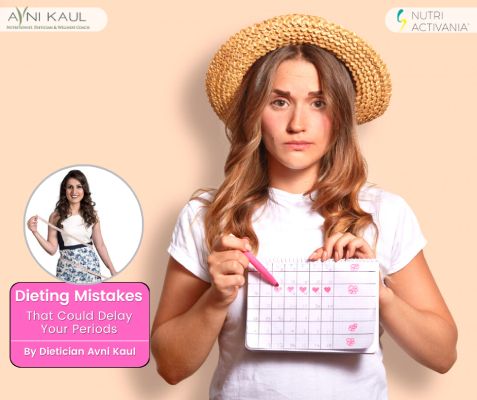Warns Nutritionist and Dietician Avni Kaul
The menstrual cycle is a vital indicator of women’s reproductive health. Having regular periods is a vital sign though the menstrual cycle pattern is different for everyone. A normal cycle range should be in the range of 25 to 35 days for the optimum functioning of hormones. Periods that are too early or late can be impacted by several factors such as stress, anxiety, medication, and diet which have a crucial role in your menstrual health.
Understanding how your diet can impact your periods can help you make informed decisions with respect to what you eat and how it affects your body, says Avni Kaul. Avni Kaul, India’s top Dietician and Nutritionist shares the diet mistakes that may delay your periods.

Wrong combinations of food
It is essential to pay attention to the kind of foods you are combining and try to eat them in a manner that promotes healthy digestion and absorption of nutrients. Wrong combinations such as fruit after lunch and tea with breakfast interrupt important nutrient absorption that is needed for healthy and regular menstrual flow.
Consuming excessive processed food
Processed food is high in calories, unhealthy fats, and extra sugar, which could lead to weight gain and a rise in blood glucose levels that further affects the role of necessary hormones estrogen and progesterone involved in the menstrual cycle.
Skipping meals
Because of the hectic lifestyle or poor dietary choices, women tend to skip meals which slow down their metabolism and leads to overeating later on in the day. This in the long run could lead to deficiencies of vitamins such as B12, D3, and zinc which are necessary for healthy period flow.
Not having adequate fruits and vegetables
Fruits and vegetables are filled with nutrients and fiber, which make you feel fuller and decrease your risk of hormonal issues. Maintaining a healthy gut microbiome is vital for overall health, and might also help to alleviate symptoms associated with menstruation.
Having a balanced diet that includes a lot of fiber, fruits, and vegetables could help support a healthy gut microbiome. Probiotic-rich foods, like yogurt, amla pickle, sauerkraut, and kefir, might also be beneficial.

Not working on nutrient deficiencies
Only relying on supplements or medications to improve vitamin deficiencies is not recommended. To prevent nutrient deficiencies, it is important to eat a balanced diet that has a variety of nutrient-rich foods. If you suspect you have a nutrient deficiency, talk to your doctor or Dietician who can help you determine the cause and recommend proper treatment or dietary changes.


